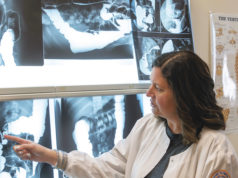Physical therapists combine proven techniques with new tech so you can get back to work and enjoy the activities you love.
By Christy Rosell
Physical therapy as a recognized medical service has been around since the 1920s, according to the American Physical Therapy Association. Today, it is common to find patients working with therapists to restore physical function related to back, neck, shoulder, and knee injuries and for post-surgical recovery. But it may surprise you to learn about some of the modern treatments physical therapists use today to help patients.
Typically, these highly trained professionals have doctorate degrees and specialize in areas such as sports medicine, orthopedics, neuromedicine, and pediatrics, as well as lesser-known areas such as women’s health and oncology.
Perhaps a more surprising change in the field is that like medical care in recent years, physical therapy is taking on a more preventative health role. Most people know physical therapists work with athletes to improve and maximize function to prevent injury. But keep reading to find out why more white-collar professionals are seeking physical therapy to get back to work after injury or for surgical intervention.
Wellstar, specialized physical therapy for all ages
Wellstar offers patients access to 60 outpatient physical therapy locations, which include orthopedics, neuro rehabilitation centers, and several specialty centers. Across Cobb County and surrounding areas at Wellstar OrthoSport and PT Solutions, the health system helps patients get back to work after sustaining an injury or undergoing a medical procedure.
“We do things to simulate getting back to work,” said Judith Niehuser, clinical supervisor and physical therapist at Wellstar OrthoSport Kennestone and Kennesaw locations. “If it’s a nurse standing for 10-plus hours, we utilize specific interventions focused to that line of work, as opposed to someone who works in a call center, who has different physical activity requirements and posture.”
Wellstar physical therapists often work as part of a multidisciplinary team to treat patients with back and neck pain, or patients who have had rotator cuff repairs, hip replacements, knee replacements, and ACL surgeries. Therapists customize treatment for each patient, using time-tested techniques such as stretching, electrical stimulation and exercise, paired with newer technology and treatments, including dry needling, cupping, and even gaming devices.
Most locations also offer aquatic therapy, which offers pain-free rehab for most injuries. Using built-in or bi-directional treadmills with resistive jets for performance challenges on all levels, patients reach their goals in record times.
And, Wellstar is adding specialty clinics to help patients with lymphedema and pelvic floor dysfunctions. “We can treat any pelvic pain in men and women,” Niehuser said. “This includes therapy for pelvic organ prolapse, incontinence, and pain with sex. Incontinence is something we can help manage and a lot of times, get rid of completely.”
Pelvic specialty clinics are available to patients in private rooms at Wellstar Orthosport locations in Vinings Health Park and Acworth. Specialized therapists at Wellstar also treat patients with lymphedema, a condition of excessive swelling that can occur as a result of trauma, venous insufficiency, or cancer treatment. “If lymph nodes are removed or irradiated as part of cancer treatment, there can be fluid build-up in the arm, leg, or head and neck area that is affected by those nodes. It can be a chronic condition,” Niehuser said.
Patients require treatment from skilled therapists to reduce the swelling and to learn techniques for lifelong self-management. There also is clinical education that can be done to help reduce the risk of onset of initial lymphedema.
In addition to adult therapy, Wellstar has dedicated pediatric physical therapists who have specialized training and expertise treating children and teens. Adolescent patients often have different needs and require different treatments due to status of bone growth and soft tissue development.
Northside offers preventative PT for athletes and weekend warriors
White-collar professionals who sit at desks, conference tables, and in cramped airplane seats for extended periods but who are highly active on weekends have an increasing need for physical therapy.
“They’re highly successful and active individuals,” said Matt Lopez, a sports-certified physical therapist for Northside Hospital Orthopedics Institute in Buckhead. “Their bodies are trying to acclimate to going from sitting [all week at work] to a high level of activity. My goal is to keep individuals as active as possible, to find strategies that allow them to complete the activities they love with minimal to no pain.”
Lopez said Northside’s sports medicine team often cares for patients preventatively, to help them avoid injury and maximize their function. “The view on wellness has shifted to recognizing that investing in your health is truly building wealth,” he said. “If I were to invest money into the stock market, I want to invest into things that bring me good return. If you can invest in your body, you’ll stay healthy and happy so when you retire you can travel, see your grandkids, [or] continue running.”
Lopez has treated NFL players, Canadian Football League members, and NBA athletes, as well as Olympic sprinters and long jumpers, and motocross riders. The technology available to these athletes also is accessible to all of his patients, including the weekend warriors.
The Buckhead location offers a Recovery Lounge equipped with advanced technology, including compression treatment boots that fill with air to reduce both pain sensitivities and recovery time. “If you’re a marathoner and you just did an 18-mile training run, you could come in and use these boots for a much faster recovery,” Lopez explained. “It allows you to push your body in training and recover with the same intensity.”
Another treatment, whole-body cryotherapy, fully immerses patients in liquid nitrogen for three minutes. The temperature can drop as low as negative 184 degrees. “The body thinks it’s going into a frozen state,” Lopez said. “It flushes blood to the core to save the vital organs and picks up nutrients. As soon as you step out, the blood is redistributed. It’s a great treatment for pain, inflammation, and joint stiffness. Many of our professional athletes are using this treatment as part of their recovery process.”
Northside Hospital also offers access to sports medicine in East Cobb, which includes orthopedic surgeons, athletic trainers, and physical therapists.
Children’s offers physical therapy just for kids
A collegiate swimmer, Anna Gleyzer had a shoulder overuse injury as a teen. She depended on Children’s Healthcare of Atlanta’s physical therapists to keep her pain-free and swimming throughout high school and college.
Because physical therapy helped her to do what she was passionate about, she became passionate about physical therapy. “I was interested in helping a young athlete like me extend their career and do what they loved,” she said. “When I got my clinical [certification] at Children’s, it was like I was coming back full circle.”
Today, Gleyzer is a board-certified sports clinical specialist and physical therapist, and serves as the site supervisor of Children’s Healthcare of Atlanta Sports Medicine/Ivy Walk in Smyrna. In her role, she helps young patients from ages eight to 21 keep doing what they love doing, whether they’ve been injured in sports or are dealing with continuous growing pains.
It’s important for adolescents to see pediatric physical therapists because their needs are different from adults. For example, children often compete in sports with high volumes of frequency and intensity. Teen injuries are unique, too, when they occur in the areas of the growth plates — the places in the bone that allow for growth.
In addition to physical differences from adults, teen athletes are developing mentally and emotionally, and have different nutritional, sleep, and rest needs. Gleyzer said pediatric physical therapists have to keep therapy fresh because kids get bored quickly. “My goal is to get them better than they were before. We can teach them things to stay strong and healthy, even if they don’t have pain,” she said.
While she is helping student athletes learn about movement and the ways they can maximize their function, Gleyzer enjoys learning the latest slang and discussing the newest Taylor Swift song or Marvel movie with her young patients. “We know how to communicate with and design treatment for that age group,” she said.
Her pediatric patients also have access to technology and new treatments. For example, Gleyzer’s team uses video capture technology to film movements in real time to help patients see how to adjust their movements to stay healthy and prevent injury. Force plates in the floor help patients see if they’re evenly loading their legs. And, a new blood flow constriction treatment allows muscles to be exercised at lower loads to achieve strength gains.
Direct access to physical therapy for all Georgians
Physical therapists are great partners for people who want to maximize their function so they can recover from pain, prevent injury, and get back to their jobs as well as the sports and activities they love. Physical therapists are highly qualified to evaluate patients and can refer them to another specialist if needed. In the state of Georgia, any patient can be seen without a referral and most insurance companies will cover the visits. However, patients who have coverage with small, private insurance companies or Medicare and Medicaid may need to ask their physician for a referral.
————-
Patient Resources
Wellstar Orthosport
wellstar-orthosport.com
Northside Sports Medicine
sportsmedicine.northside.com
Children’s Healthcare of Atlanta
choa.org/medical-services/sports-medicine/sports-physical-therapy




